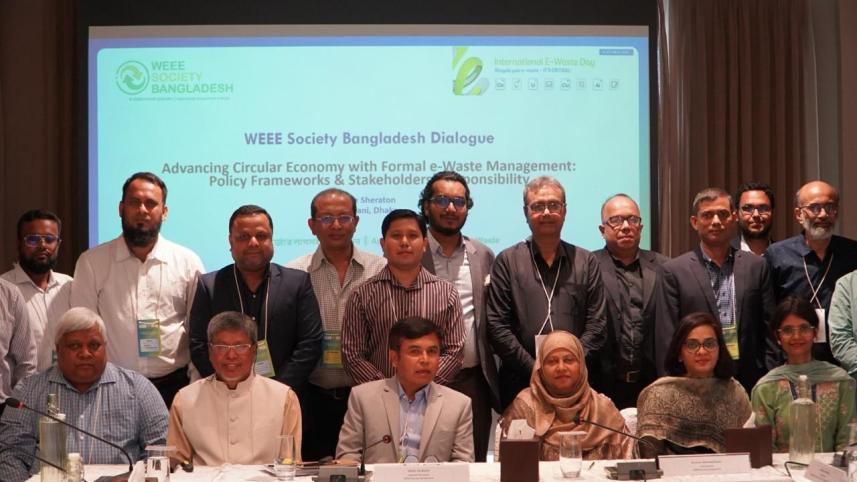E-waste could bring $500m a year: expert

- Bangladesh loses $500m lacking e-waste system
- Informal recycling fuels health, environmental hazards
- Red tape, weak regulation block vital investment
- Experts urge incentives, producer responsibility laws
Bangladesh is missing out on a potential $500 million economic opportunity every year due to the absence of a formal electronic waste (e-waste) management system, according to an expert.
"In Bangladesh, we generate 2.2 kilogrammes of e-waste per person, with a financial value of over $500 million if 100 percent is recycled formally," Akter Ul Alam, general secretary of the WEEE Society Bangladesh, said yesterday, citing data from the Global E-waste Monitor 2024.
"Yet, we are not just failing to capture this economic value; the informal and unsafe processing of this waste is creating a public health hazard and polluting our ecosystem," he added while speaking at a discussion in Dhaka on advancing the economy through formal e-waste management.
Bangladesh generates around 367 million kilogrammes of e-waste annually. A major hurdle in recycling that waste is the "absence of structured collection mechanisms" and a stark "lack of integration between formal and informal recycling sectors."
Furthermore, Alam said recyclers face a huge red-tape barrier, requiring permission from 21 authorities annually, and are "yet to be recognised as an industry," blocking vital investment.
The WEEE Society, a group of environmental professionals, advocates a circular approach focusing on maintenance, reuse, and refurbishment before certified recycling.
The society recommended unlocking the financial and environmental potential by implementing Extended Producer Responsibility laws to make manufacturers financially accountable for their products' end of life, creating incentive programmes, and waiving taxes on spare parts to boost the repair industry.
"The necessity of stronger regulations, active collaboration with government agencies, and the fostering of public-private partnerships was emphasised," Alam said.
Without a formal system, the vast majority of Bangladesh's e-waste, laden with toxic materials like lead and mercury, is handled by the informal sector, leading to unsafe recovery practices that endanger workers and leak pollutants into soil and water.
This stands in contrast to the potential of formal recycling, which could prevent environmental damage and create a new, green industry.
Sumon Ahmed Sabir, president of the WEEE Society, said the first step to resolving the e-waste management crisis is collection. "But we lack an effective mechanism for it."
"Secondly, the valuable components of e-waste are not being properly extracted. What we are essentially doing is exporting some parts, allowing foreign companies to profit, while we gain very little. Moreover, there is a serious lack of public awareness," he added.
Sohel Ahmed, executive director at Vista Electronics Ltd, also noted that e-waste is not being managed under any clear framework. "When waste is removed, we don't even know where it goes."
Prof Khondaker Mohammod Shariful Huda of the Department of Geography and Environment at Jahangirnagar University identified batteries and IPS units as major sources of e-waste.
"There is no clear picture of how these are being disposed of or recycled. E-waste is contaminating our water bodies," he added.
Mahmud Hossain, a commissioner at the Bangladesh Telecommunication Regulatory Commission, said, "In the telecom sector, the e-waste that is generated by networks is five percent, while the larger share of the e-waste is made up of discarded handsets. We have taken steps to address the network-related e-waste, but the discarded handsets need to be regulated."
Also speaking at the event, Ahsan Sharif, director of public projects at Fiber@Home, suggested introducing incentives for those involved in the collection and recycling of e-waste.



 For all latest news, follow The Daily Star's Google News channel.
For all latest news, follow The Daily Star's Google News channel.